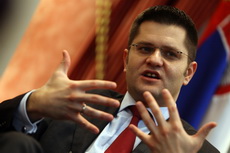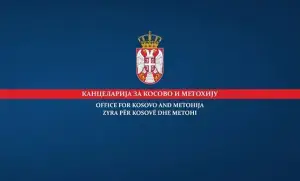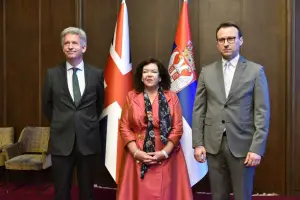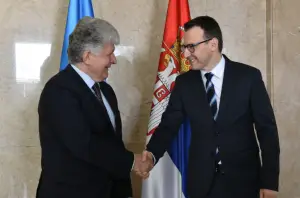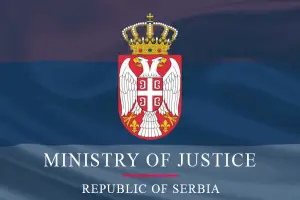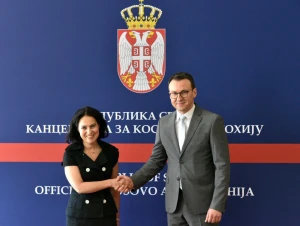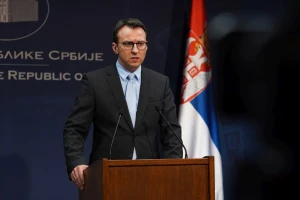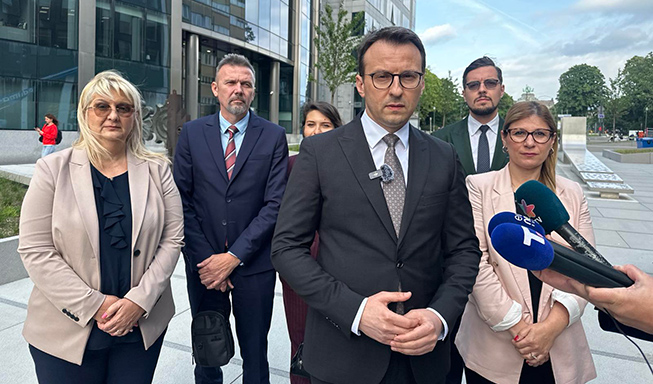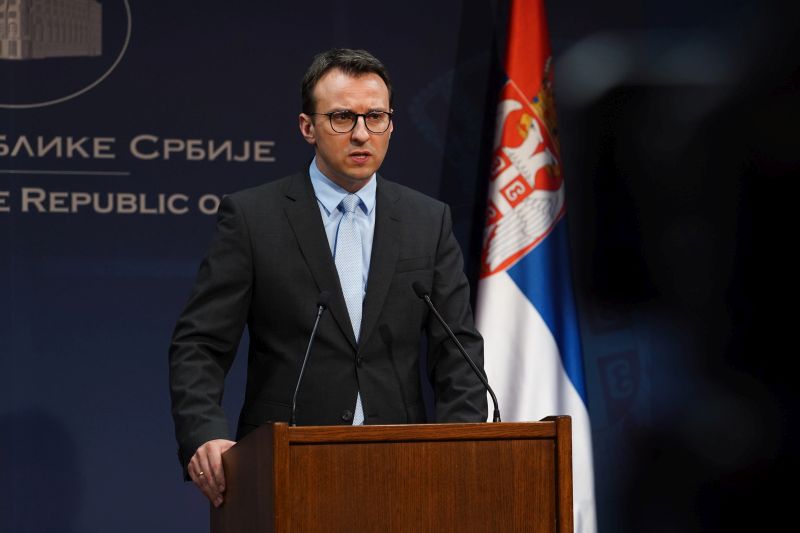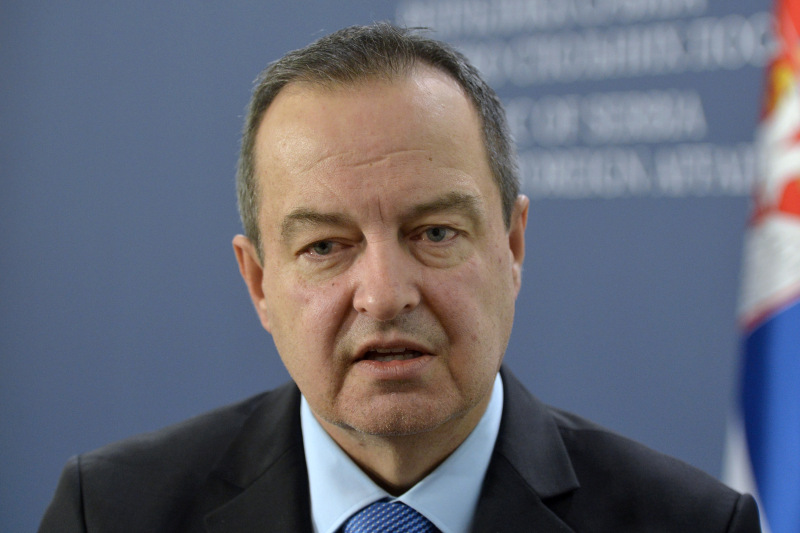Q:
A:
Serbia will continue to fight with diplomatic means for preservation of sovereignty, territorial integrity
Belgrade,
26 July 2010
Minister of Foreign Affairs Vuk Jeremic said that Serbia’s position is much more difficult after the International Court of Justice (ICJ) passed its advisory opinion on the legality of the unilaterally proclaimed independence of Kosovo, but that it will continue to fight with political and diplomatic means for the preservation of its sovereignty and territorial integrity.
Jeremic outlined in a broadcast on Radio Television of Serbia last night that the opinion the ICJ gave on Kosovo’s independence is a heavy blow to Serbia and that now it will need much more skill to explain to the countries that have not recognised Kosovo’s independence why they still should not do so.
The Minister announced that envoys of Serbian President Boris Tadic will be sent to capitals of 55 countries that are believed to be on the verge of recognising an independent Kosovo because these countries will be under even greater pressure than before to change their position. The letter that will be given to these countries will specify that the ICJ did not approve Kosovo’s secession and that there is a danger that secessionism and separatism might become an internationally acceptable phenomenon. In the letter, these countries will be asked to refrain from recognising an independent Kosovo until the debate in the UN General Assembly, to be held in autumn, has ended.
Jeremic remarked that some influential countries have not at the very least changed their position on Kosovo and that Russia, China and Spain have taken the official stance that the ICJ’s opinion will not make them change their decision. The Minister explained that the recommendation of making Kosovo an UN member cannot be made as long as Russia and China, which are the UN Security Council members with the right to veto, remain faithful to their position. Speaking about the EU countries that have not recognised Kosovo’s independence, the Minister noted that Slovakia, Cyprus, Spain and Romania have made it clear that they will not change their position on Kosovo. Commenting on the case of Greece which has come out with a stance that might be interpreted in different ways, Jeremic underlined that in the contacts with this country’s top officials in the last few days there has been no indication that they will change their position, adding that Serbia’s officials strongly urged the Greek authorities not to change their stance.
It is of vital importance that we demonstrate unity in the conclusion of the debate of the Serbian parliament on the ICJ’s opinion on Kosovo and to show which path we want to follow, because the strength of our position before the world will depend on how united we are, Jeremic stated.
Today we are sending a message to the world on whether we are united in our efforts to continue with the policy that highlights the importance of preserving the country’s sovereignty and territorial integrity in a peaceful, diplomatic and dignified way, despite all the pressure we will be exposed to, the Minister declared.
He illustrated that with its answer, the ICJ avoided interfering with politics, leaving the answer to the most important question of the status of Kosovo to the UN General Assembly.
Jeremic affirmed that Serbia will defend its interests before the UN and will ask for a compromise solution. He added that the final text of the resolution that will be submitted to the General Assembly in the UN has still not been made and that a process of consultation is underway.
The goal of this resolution is to open new negotiations that will make it possible for a solution acceptable to both sides to be found, Jeremic expounded.
The idea is to prevent Kosovo’s membership in the UN and to find a solution that is not against the Serbian Constitution and that will enable lasting peace and stability in the Western Balkans.
The Minister announced that envoys of Serbian President Boris Tadic will be sent to capitals of 55 countries that are believed to be on the verge of recognising an independent Kosovo because these countries will be under even greater pressure than before to change their position. The letter that will be given to these countries will specify that the ICJ did not approve Kosovo’s secession and that there is a danger that secessionism and separatism might become an internationally acceptable phenomenon. In the letter, these countries will be asked to refrain from recognising an independent Kosovo until the debate in the UN General Assembly, to be held in autumn, has ended.
Jeremic remarked that some influential countries have not at the very least changed their position on Kosovo and that Russia, China and Spain have taken the official stance that the ICJ’s opinion will not make them change their decision. The Minister explained that the recommendation of making Kosovo an UN member cannot be made as long as Russia and China, which are the UN Security Council members with the right to veto, remain faithful to their position. Speaking about the EU countries that have not recognised Kosovo’s independence, the Minister noted that Slovakia, Cyprus, Spain and Romania have made it clear that they will not change their position on Kosovo. Commenting on the case of Greece which has come out with a stance that might be interpreted in different ways, Jeremic underlined that in the contacts with this country’s top officials in the last few days there has been no indication that they will change their position, adding that Serbia’s officials strongly urged the Greek authorities not to change their stance.
It is of vital importance that we demonstrate unity in the conclusion of the debate of the Serbian parliament on the ICJ’s opinion on Kosovo and to show which path we want to follow, because the strength of our position before the world will depend on how united we are, Jeremic stated.
Today we are sending a message to the world on whether we are united in our efforts to continue with the policy that highlights the importance of preserving the country’s sovereignty and territorial integrity in a peaceful, diplomatic and dignified way, despite all the pressure we will be exposed to, the Minister declared.
He illustrated that with its answer, the ICJ avoided interfering with politics, leaving the answer to the most important question of the status of Kosovo to the UN General Assembly.
Jeremic affirmed that Serbia will defend its interests before the UN and will ask for a compromise solution. He added that the final text of the resolution that will be submitted to the General Assembly in the UN has still not been made and that a process of consultation is underway.
The goal of this resolution is to open new negotiations that will make it possible for a solution acceptable to both sides to be found, Jeremic expounded.
The idea is to prevent Kosovo’s membership in the UN and to find a solution that is not against the Serbian Constitution and that will enable lasting peace and stability in the Western Balkans.

